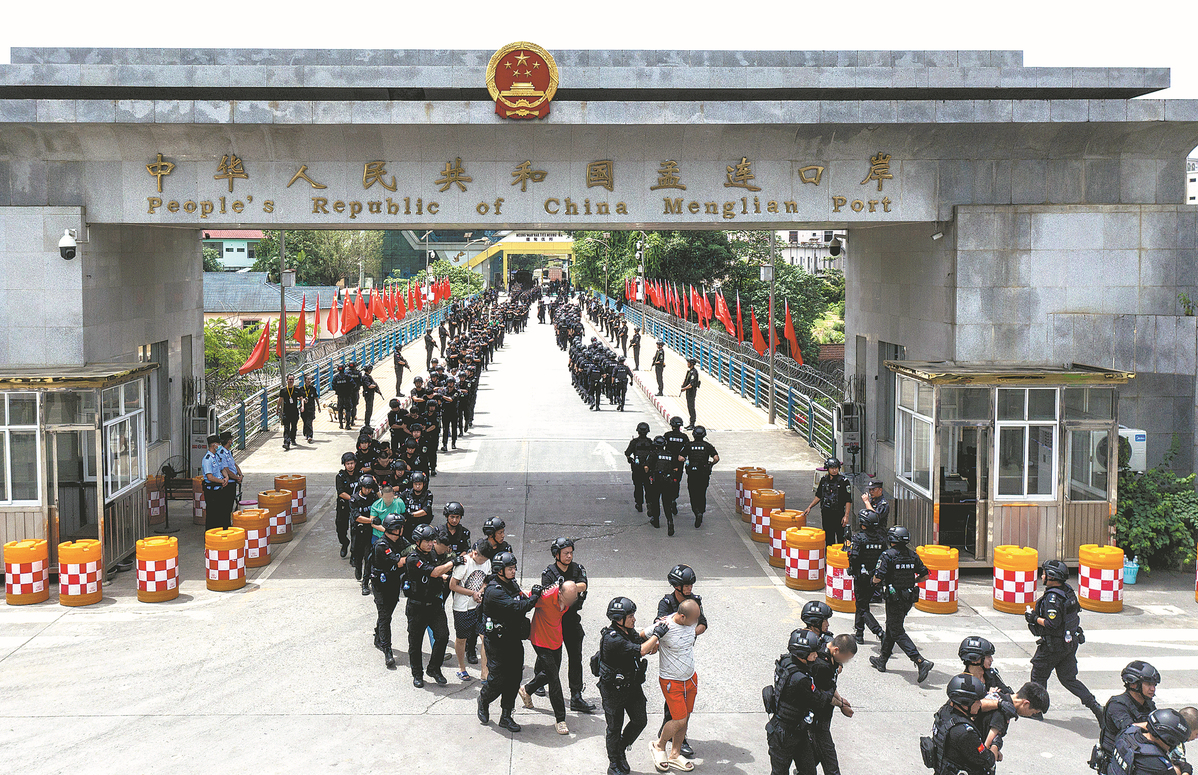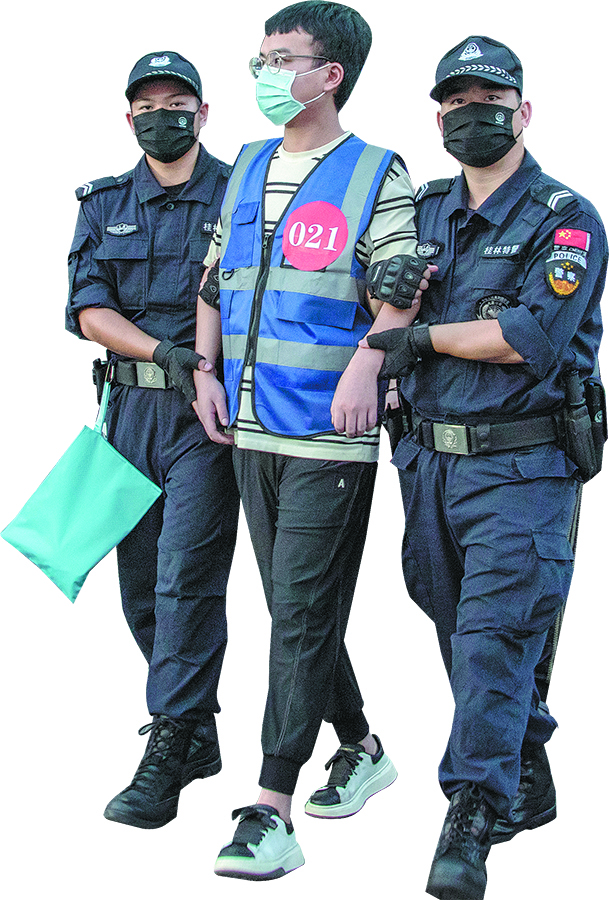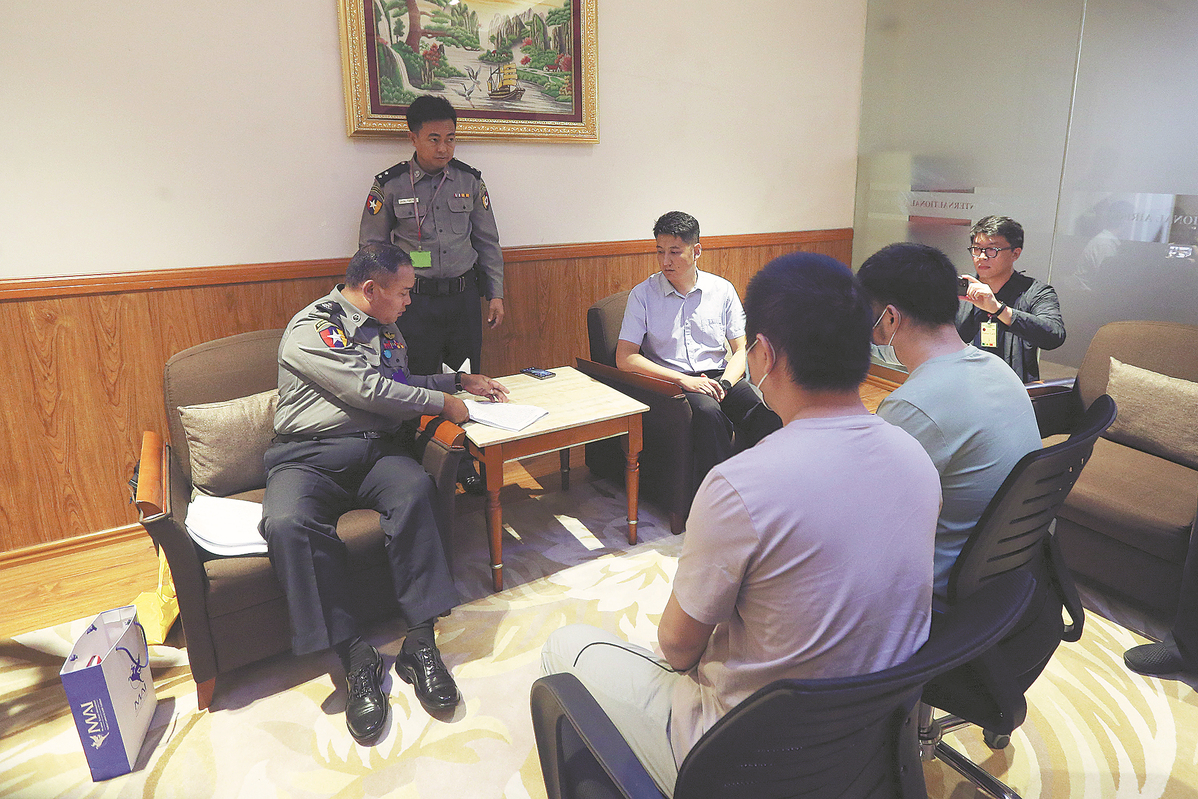Telecom fraudsters cast long shadow

More than 1,200 fraud suspects are handed over to Chinese law enforcement officials on Sept 6 in Pu'er, Yunnan province. [Photo/CHINA DAILY]
Criminal gangs lure recruits with promises of high-paid work
A 24-year-old man from Nanchong, Sichuan province, is bitterly regretting his impulsive decision to join a company in northern Myanmar on the advice of a friend he met online.
"I would have been married this year if I hadn't inadvertently taken part in telecom fraud," said the man, who uses the alias Li Ming and was speaking at a detention center in his home city, where a number of criminal cases linked to him are pending.
Attracted by the prospects of earning a high salary, Li joined the company in Myanmar in March 2020 after being told about it by the friend he met in cyberspace.
However, he said the following seven months were the darkest period of his life, as he faced hunger, beatings, threats and a life-or-death escape.
Li was traded among six groups involved in fraudulent activities, before eventually escaping from the clutches of the last group to be smuggled back to China in October 2020.
In June last year, Li was arrested while working in Fujian province. His arrest resulted in his girlfriend ending their relationship. Those accused of fraud with him gave evidence of Li's criminal acts.
The law enforcement department in Nanchong also confirmed that at one of the fraudulent companies Li worked for from Sept 21 to Oct 21, 2020, he cheated victims out of more than 82,000 yuan ($11,200). After his arrest, Li refunded 13,000 yuan.
In October, he was sentenced to 17 months in prison for telecom fraud and for crossing the national border illegally.
"People should not trust high-paid jobs advertised online, but should rely on their own abilities and take life steadily. They should not challenge China's laws," Li said, adding that he was lucky to get home, as others who joined such illegal ventures may have died overseas.

One of dozens of Chinese telecoms fraud suspects is escorted back from the Philippines. [Photo/China Daily]
Lucrative offer
Li dropped out of senior high school after his junior year to start work. After taking a number of jobs, he ended up working as a pharmaceutical sales representative at a company in Chongqing, earning about 9,000 yuan per month.
In February 2020, Li met a friend online while playing games. After chatting from time to time for about a month, the man offered Li a lucrative job in northern Myanmar, promising him that he would make at least 50,000 yuan per month. However, he did not give Li any details about the work.
The man also agreed to cover costs for travel and accommodations, and told Li that he could leave at any time if he was not satisfied with the job.
"Lured by the high salary, I accepted the job without thinking carefully about it. I provided my ID card number, bank account details and phone number to the man, who booked flight tickets and a hotel for me," he said.
Following the man's instructions, Li flew to a city in Yunnan province near the border with Myanmar in March 2020.
He was later taken to a shabby flat in the mountains, where he and several others were driven by tractor along remote roads for several hours to evade checkpoints. After walking on mountain paths for more than 10 hours before boarding a dinghy to cross a river, the group entered northern Myanmar and was taken to a company.
Li's personal items were seized on arrival, and he was told he owed the company money for his travel and smuggling fees. He was also told he could not leave unless he paid the money or met the company's income targets. At this point, Li realized he had been cheated and was trapped.
The manager of the company told Li and the others that in China they could never earn the amount of money they could make in a short time with the company, before providing them with details on how to build relationships with their targets and extract money from them.

Fraud suspects are handed over to Chinese police in Pu'er, Yunnan, on Sept 6. [Photo/China Daily]
Lost investments
Li and the others worked and lived on the company's premises, with only the management personnel allowed to leave.
The work team Li was with comprised about 20 people, all of them Chinese, with each having two smartphones to download apps to find potential victims.
The group was instructed to use "sweet talk" to engage with victims, before getting them to make an investment, in which the victims ended up losing their money.
Li posed online as a successful businessman. The group members targeted divorced or single women, and created posts claiming they were single themselves. By discussing their financial situation, they slowly persuaded their victims to invest in a certain app offered by the fraudulent company, making it difficult for the victims to retrieve their money.
Li was required to interact with dozens of women a day. If a victim asked to meet him in person or via video chat, the company made excuses for Li not being available.
"We were instructed to keep track of the people we talked to each day, otherwise, we would be penalized and not allowed to eat or sleep," Li said.
He once considered calling the police, but everyone at the company and their mobile devices were monitored closely. Li was also intimidated by others at the company, who warned that calling the police would lead to "terrible consequences" and that he would be locked in a water dungeon.
Due to his poor performance, the company demanded 150,000 yuan from Li's family members as a ransom, which they could not afford. As a result, Li was sold to another fraudulent company.
In October 2020, at the last company, Li said he wanted to go out for a meal, as he had not enjoyed good food for a long time. He promised to do his best to make money for the company. While outside with his superiors, his phone was returned to him, and he saw his chance to escape.
Moments after their manager left, Li and two other men took a taxi and traveled for more than three hours. At a restaurant, they obtained the contact details of a human trafficker, before joining about 10 other people to return to China.

Police from Myanmar hand telecoms fraud suspects (front) to a Chinese police working group on Aug 23. [Photo/Xinhua]
Difficult investigation
Police in Nanchong first discovered clues to telecom fraud, including details of Li's case, in February 2021. They arrested a number of suspects and examined the evidence of fund flows and communication records provided by the suspects, along with information about electronic communications, payment settlements, and transportation records.
This work led to the identification of more than 2,000 individuals connected to 21 fraud groups. Police then formed a special task force to work on the case in April 2021.
Nanchong police said that from January last year to March this year, they arrested 842 suspects who returned to China from northern Myanmar, including Li.
Qiao Jun, a police officer in Nanchong involved with handling the cases, said those arrested returned to China on their own volition, before being questioned by police.
The suspects often claimed to have been coerced into taking part in fraud, Qiao said, adding that when fraud groups are located overseas, law enforcement agencies face challenges in obtaining evidence from abroad.
"We used the national anti-fraud platform to search for victims, and at the same time, we carried out tests on the suspects' phones to find key information to make a breakthrough in the case," Qiao said.
Li Jianbing, a prosecutor at Nanchong People's Procuratorate, said many of the suspects confessed to their crimes during interrogation, but later made a U-turn by saying they were victims of fraud themselves. Some even retracted their initial confessions after learning that the police did not have sufficient evidence against them.
"These fraud groups are familiar with China's anti-fraud policies, and they conduct special training for their members to escape investigation," Li Jianbing said. "Their internal hierarchies are well-defined, with a strict division of labor. Members from different groups rarely interact, and they avoid gathering in one place, making it difficult to identify common criminal activity."
Given the difficulties of investigative work, the procuratorate and public security bureau carried out several joint studies. Prosecutors then advised the public security authorities to collect evidence of illegal border crossings — a relatively easy crime to prove — before proceeding to the more complex crime of fraud, Li Jianbing said.
"This approach ensured that the suspects could be arrested promptly, allowing more time to investigate crimes related to fraud," he said.
The authorities also collected other evidence, such as flight or train tickets, bookings for accommodations, border crossing details, and phone call records, Li Jianbing added. Officers conducted additional interrogations of suspects based on the evidence they collected and examined. As a result, the suspects' contradictory statements were exposed.
Furthermore, cross-examination was carried out among the suspects to eliminate any possible doubt. These actions enabled police to form a complete evidence chain for the cases to be transferred for review and successful prosecution, Li Jianbing added.
The Nanchong procuratorate said more than 500 people have been handed over to the authorities. Over 400 of them have been prosecuted, and other cases are still under investigation.
Government efforts
For the past three years, telecom fraud cases have ranked among the top three types of crime in China, and taken place in terms of financial crime. Last year, the amount of money involved in fraud reported in China exceeded 2 trillion yuan, data from the Supreme People's Procuratorate show.
The central government attaches great importance to curbing such crimes with the rule of law, and departments at all levels are working together to combat fraud cases.
In April last year, the General Office of the Central Committee of the Communist Party of China and the General Office of the State Council, China's cabinet, issued a document on fighting telecom fraud, requiring different departments to form a strategy to crack down on such offenses and associated crimes.
The authorities were also asked to improve the investigation and punishment mechanism regarding funds involved in fraud, and maximize the recovery of stolen goods.
In September last year, China's top legislature approved a law against online fraud, which took effect in December. This legislation provides special legal support for combating such crimes.
In July, the Commission for Political and Legal Affairs of the CPC Central Committee proposed enhancing law-based governance to combat telecom fraud and cut links in criminal chains from the source. The commission also called for a crackdown on overseas telecom fraud and domestic collaborators.
China has also cooperated with Myanmar, Indonesia, Thailand and other countries this year to crack down on overseas telecom fraud groups via a police cooperation mechanism. For example, law enforcement agencies in northern Myanmar have handed over 4,666 fraud suspects to China.
Due to a strict crackdown, since August, the number of telecom fraud cases and the amount of property losses in China have fallen year-on-year by 24 percent and 20.5 percent, respectively, the Ministry of Public Security said.
Photos
Related Stories
- Myanmar fraud-gang leaders arrested, chief criminal commits suicide
- China hopes for stability in Myanmar the most, this remains unwavering: Global Times editorial
- China calls on relevant parties in Myanmar to cease fire, settle disputes via dialogue, consultation: spokesperson
- China seeks public input on telecom, online fraud penalties
- Chinese Police offer $68,400 reward for telecom fraud ringleaders in northern Myanmar
- China-Myanmar border areas work toward common prosperity
Copyright © 2023 People's Daily Online. All Rights Reserved.









